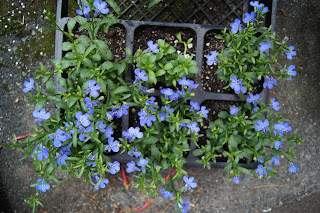This is the time of year when garden
tasks start to get ahead of me. After Memorial Day, any un-mulched soil in my
vegetable bed is suddenly full of weeds that I should pull out now before they
smother my peas and lettuce and before I plant my tomatoes and green beans,
another task I should have finished by now.
For
weekend gardeners like me, time is the scarcest resource. I always have to
triage how I’ll spend my gardening time. I never get everything done. As the
weekend approaches, I keep a shifting tally of priority tasks. After walking by
a neighbor’s vegetable garden and noticing that her tomatoes are already well
established, I decide the vegetable garden should come first. Then I park my
car next to the six-packs of annuals I left sitting in the driveway, and I
think I should pot up my container plantings before the candidates die waiting.
I sense a constant drumbeat: hurry, hurry, hurry! You’re late!
 |
| Plant me! |
This
shortage of time may be partly due to an outdated gardening paradigm, the one
where arduous work is needed because I’m the boss and sole responsible party in
my garden. Fortunately, one thing I’m learning from my transition to more
sustainable gardening methods is that some of my old techniques and approaches
weren’t worth the time and effort. For example, in spring I used to turn the
vegetable bed with my spade to prepare for planting. I found out that it’s
better not to till or turn the soil for a host of reasons.
Tilling
brings weed seeds to the surface to germinate, it introduces oxygen that causes
quicker decomposition of organic material, and it breaks up fungal networks
that could be cooperating with soil bacteria and plant roots to provide plants
with better nutrition. So I’ve crossed turning and raking the bed off my to-do
list. Now I plant through the layer of compost I applied before the growing
season started.
I’m
slowly learning a new way to garden, one that doesn’t assume that I have to
make a garden alone by the sweat of my brow. Instead, I’m recognizing that
natural systems are effective and complex, more complex than we can probably
know at this point in history—or ever. My goal is to learn to go with the flow.
I hope that will mean spending less time spinning my wheels and more time
understanding and appreciating how my garden ecosystem works.
No comments:
Post a Comment